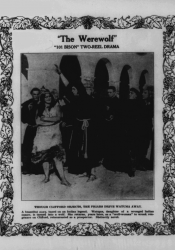Silent film "The Werewolf" released
Directed by Henry MacRae, and written by Ruth Ann Baldwin, the film was based on an 1898 short story The Werwolves [sic] by Québécois writer and former mayor of Montréal, Honoré Beaugrand (erroneously cited as Henry Beaugrand). The film is considered lost, as all prints were supposedly either destroyed in a 1924 fire at Universal Studios, or when executives at the studio purposefully destroyed the bulk of their silent picture negatives in 1948.
The Werewolf is important for three reasons. First, depending on one’s definition of monster, Phyllis Gordon’s portrayal of the werewolf Watuma makes her cinema’s first monster. Second, the film suggests that Watuma can change herself from woman to wolf just like Clemence Housman’s White Fell in The Were-Wolf. That cinematic standard for changing from human to animal would continue until 1935 when the first wolf/human hybrid make-up was achieved for The Werewolf of London. And finally, The Werwolves, that tale that inspired The Werewolf, is often cited as a staple of werewolf storytelling. Beaugrand’s story not only inspired The White Wolf (1914), but the French film Le Loup Garou (1923), and Wolf Blood: A Tale of the Forest (1925), which is the only one of these early films to survive.

